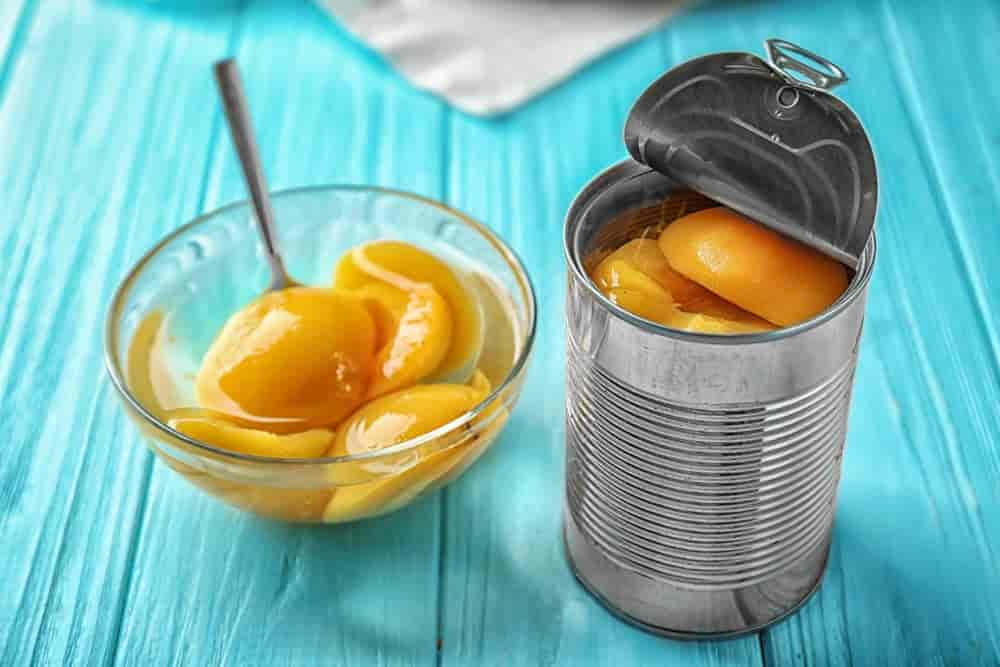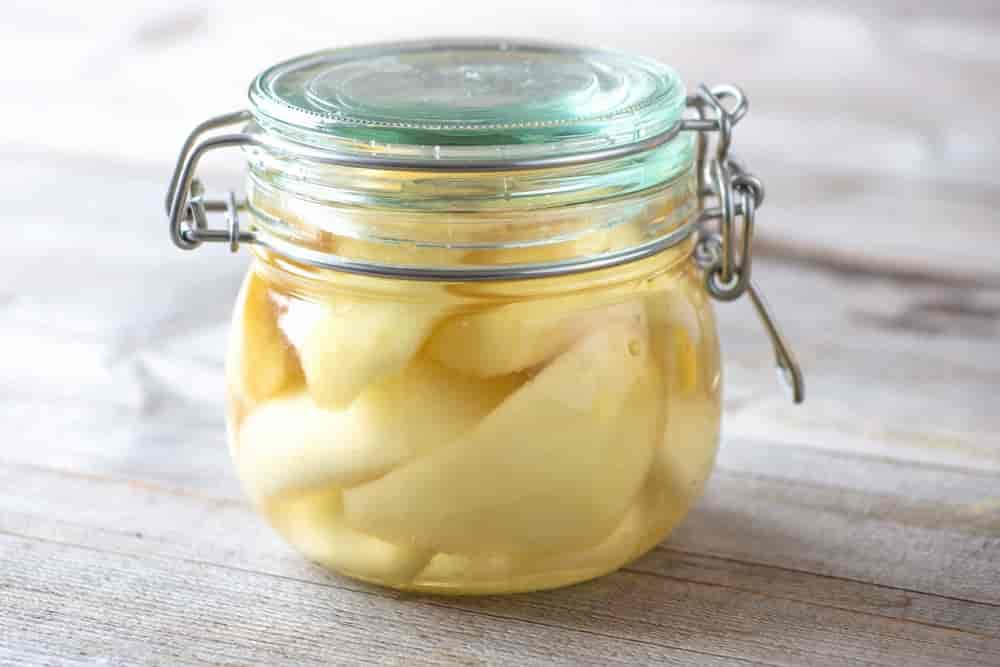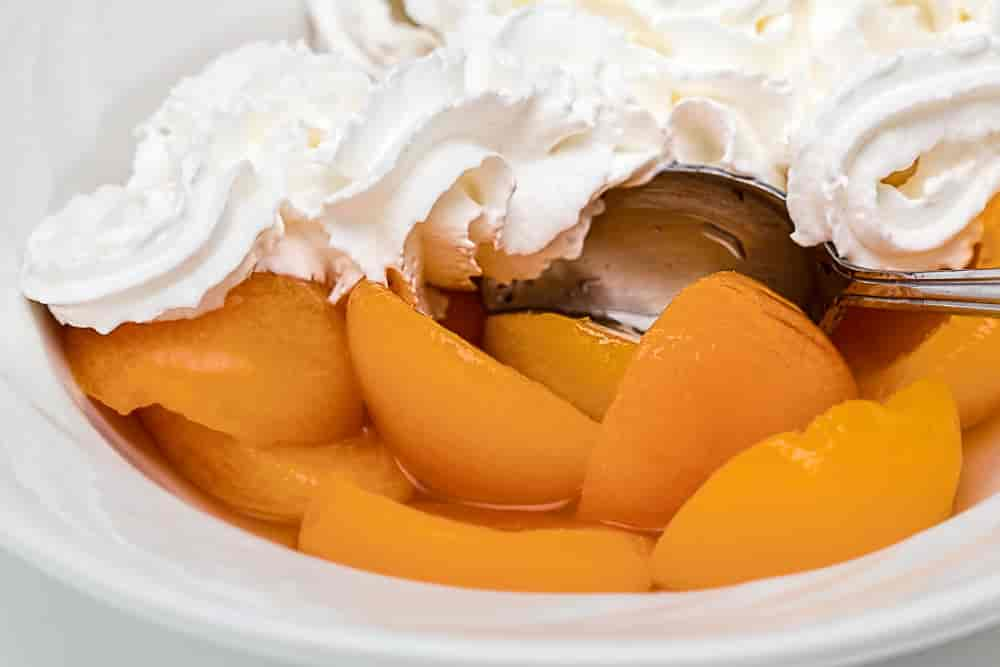It is true that canned pears are nutritious and low in sugar and also high in healthy nutrients for your body. Canned pears retain some of their nutrients even after processing.
About 1 gram of vitamin C, 0.2 milligrams of iron, 53 milligrams of potassium, and 4 milligrams of calcium may be found in every 100 grams of pears. Canned pears still contain trace amounts of elements including magnesium, phosphate, tin, copper, and manganese.
Pears kept in either syrup or water have almost the same concentrations of these vitamins and minerals. Canned pears retain some of their nutrients even after being processed.

Pears kept in either syrup or water retain approximately the same quantities of these vitamins and minerals. The fiber in the diet has been linked to fewer gastrointestinal issues, lower cholesterol, and a reduced risk of cardiovascular disease. Preserved pears in liquid offer 1.6 grams of fiber per serving. When maintaining a 2,000-calorie diet, 28 grams of fiber per day is suggested.
You may find that eating canned pears helps you attain your goal weight. Consuming dietary fiber may aid with constipation, lower cholesterol, and reduce the risk of cardiovascular disease. Preserved pears in liquid provide 1.6 g of dietary fiber per serving.
At least two daily servings of fruit are recommended for optimal health. Canned pears may help you achieve your daily fruit requirement even though fresh fruits are better for you since they include more vitamins, minerals, and fiber.
Canned fruit is a convenient alternative. You should think about the packing fluids while deciding on a certain brand of canned pears. Preserved pears that are not drenched in syrup are frequently healthier for your health, so look for those that are preserved in water or juice. As a result of their high-water content, pears do not have a particularly high energy density.
One serving of canned pears, which is 100 grams and is packed in water, has 29 calories. Pears with heavy syrup contains 74 calories per similarly sized portion. To give you an idea, 100 grams, or approximately half a cup, of canned pears is all you need for a satisfying meal. A pear’s low energy density may be attributed to the huge amount of water it contains.
A 100-gram portion of canned pears packed in water has just 29 calories. Canned pears may have significantly different amounts of fat depending on the liquid used during processing.
Pears stored in water have just 0.03 grams of fat per 100 grams, making them a very low-fat snack option. When compared to fresh pears, the 0.13 grams of fat contained in pears preserved in heavy syrup is roughly four times more.
Pears are inherently sweet due to the presence of both glucose and fructose. To put it another way, a serving of pears packed in water has 6.1 g of sugar. A single serving of pears soaked in thick syrup might contain more than 15 grams of sugar.
Canned pears in syrup are much less nutritious than canned pears in water or juice. Sugars of both the glucose and fructose varieties are present in pears’ natural makeup. One serving of pears drenched in thick syrup might contain more than 15 grams of sugar.

Pears, delicious fruit from the Rosaceae family of bushes, are among the most widely consumed fruits in the world. Pears have two common names: pears and pears.
The sweet, juicy flavor and round, firm texture of pear are well-known characteristics. Pears may come in a wide variety of shapes and sizes; some are more cylindrical, while others are perfectly round with no discernible neck. Pears may be any shade from vibrant green to tawny red to sunset yellow depending on their ripeness. True, some pears are green, but others are yellow.
The pear’s skin is unusually rough compared to that of other pears, which tend to be smooth. Due to its high vitamin and fiber content, as well as its many other components, eating pears has numerous beneficial effects on health.
Not only do pears taste great, but they also provide several health benefits, including those listed below. Pears may be a good source of vitamins C, K, niacin, and folate. Vitamin C boosts the immune system, making us less susceptible to a broad range of infectious diseases. The body needs vitamin K for both normal blood clotting and bone mineralization.
Niacin and folate are two nutrients necessary for cellular function and energy production. A person’s nutrient and electrolyte intake, particularly copper and potassium, may be greatly improved via regular pear eating. Copper aids in immune system function, but it also plays a role in nerve transmission and cholesterol synthesis.
Both the heart and muscle contractions rely on potassium to work properly. The skin, or peel, of a pear, is where many of the fruit’s concentrated nutrients are located. Therefore, the best way to get the health advantages of pears is to consume them whole.
The peel may include poly nutrients such as carotenoids, anthocyanins, flavonols, and hydroxybenzoic acid. The concentration of these pigments is highest in the red-skinned species. Polynutrients may improve cardiovascular health, eye health, and vascular strength.
For example, the polyphenol antioxidants found in pear peels are helpful in the fight against many different types of oxidative illnesses. Both soluble and insoluble fibers are present in high quantities in pears.

They help with digestion by easing constipation and regulating bowel movements. These fibers are beneficial not just to ourselves, but to the bacteria that reside in our intestines as well. Anti-inflammatory flavonoid antioxidants, copper, vitamins C and K, and protection against a broad range of diseases may all be found in pears (diabetes and heart disease).
Procyanidins and Quercetin, two types of antioxidants found in pears, have been shown to decrease LDL cholesterol levels and arterial stiffness. The possibility of future cardiovascular problems is therefore reduced. Weight loss may be aided by regular consumption of pears owing to their high water and fiber content and low-calorie count.
The pear is a superfruit because it has many nutrients that are good for you. Raw, roasted, or poached preparations are just a few of the many ways we may include them into our normal diet. If you eat them regularly, you may get the health benefits they provide.
Approximately 6 grams of insoluble fiber, or about 22% of the daily requirement indicated for an adult, may be found in a single medium-sized pear. Saturated and unsaturated fats are found in pears in very small amounts. In addition to their low protein content, pears are not a complete source of any of the essential amino acids.
Nevertheless, their makeup includes trace amounts of glutamic acid, lysine, and leucine. The vitamin C content of pears is high; one serving provides around 13% of the daily value. One pear may provide around 6 percent of your daily copper needs and 6 percent of your potassium needs. Pears are a great way to get your daily dose of fruit, and eating two a day is highly advised.
Using a juicer, one may extract as much liquid as possible from a pear without containing any of the pulp or other fibrous material. Pears have a high concentration of both minerals and antioxidants, and juicing them is a great way to retain all of the fruit’s natural goodness.

Vitamin C, potassium, copper, vitamin K, different B vitamins, anthocyanins, flavonols, phosphorus, magnesium, calcium, and iron are just some of the necessary vitamins, minerals, and other powerful components that may be found in pear juice. You can get pear juice at any supermarket or health food shop.
Sagharcanned company has a long history to produce different types of canned foods, fruits, vegetables, meats, and caviar in the international market. If you want to get high-quality canned goods, visit our website and choose your favorite one.

Your comment submitted.